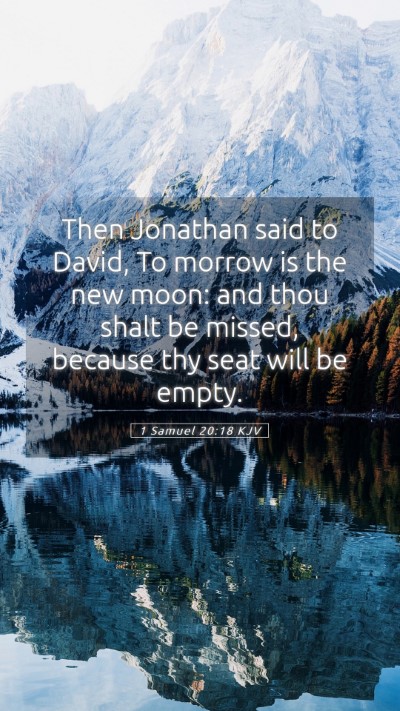Understanding 1 Samuel 20:18
The verse 1 Samuel 20:18 states:
"Then Jonathan said to David, 'Tomorrow is the New Moon; you will be missed because your seat will be empty.'" (1 Samuel 20:18, ESV)
This passage highlights the deep friendship and covenant between Jonathan and David, revealing the layers of emotional and social implications present in their relationship.
Bible Verse Meanings and Interpretations
In this verse, Jonathan informs David about a crucial timeframe, which serves both as a literal event (the New Moon festival) and as a significant marker in their evolving dynamics and the looming threat David faces from King Saul.
Contextual Analysis
- Historical Context: This verse occurs during a period of political tension where Saul, the reigning king, feels threatened by David’s rising popularity. Jonathan, Saul’s son, becomes a pivotal figure who navigates loyalty to his father and his profound bond with David.
- Cultural Significance: The New Moon festival held significant agricultural and ritualistic importance in ancient Israel. It was a time of feasting and religious observance, thus making Davids' absence noticeable.
Verse Breakdown
According to Matthew Henry, Jonathan's remark illustrates not only his direct concern for David's safety but also the degree to which their friendship is characterized by deep empathy and mutual respect. Jonathan clearly signifies the importance of their bond, identifying the without doubt absence of David will raise alarms.
Albert Barnes adds that this statement from Jonathan was not merely about the absence but was rich with implications about loyalty, dedication, and the consequences of Saul's intentions toward David. Jonathan's awareness of the situation is indicative not only of his cleverness but also of a keen sense of justice and protection for his friend.
Adam Clarke emphasizes that this moment encapsulates the tension within Jonathan's heart, torn between his loyalty to his father Saul and his friendship with David. Jonathan serves not only as a protector but also as a bridge between David and the royal family, showcasing the complexity of relationships bound by love and conflict.
In-Depth Bible Verse Analysis
This verse serves as a starting point for understanding the broader narrative of 1 Samuel, where themes of friendship, loyalty, and the struggle for power are vividly depicted. Jonathan's words reveal a deep understanding of the political landscape and the personal stakes involved.
Application in Daily Life
The application of such a verse in modern life can prompt us to reflect on our commitment to our friendships. It encourages honesty and caution in relationships where loyalties may conflict, as Jonathan navigates his love for David while being truthful to his father.
Key Takeaways
- Empathy and Awareness: Jonathan exhibits a profound level of empathy, reminding us to be sensitive to the needs and situations of our friends.
- The Importance of Loyalty: The complexities of loyalty reveal the need for discernment in our personal and social affiliations.
- Recognizing Cultural Significance: Understanding the significance of religious observances like the New Moon can deepen our appreciation for the context of biblical events.
Additional Bible Cross References
- 1 Samuel 18:1-4: David and Jonathan's covenant of friendship.
- 1 Samuel 19:1-7: Jonathan's mediation between David and Saul.
- 1 Samuel 23:16-18: Jonathan's support for David during his time of need.
Conclusion
In essence, 1 Samuel 20:18 is rich with implications about the nature of trust, loyalty, and friendship amid adversity. Through the lens of Jonathan's care, we learn that sometimes genuine relationships require us to engage deeply and thoughtfully with the lives of those we cherish. Understanding these dynamics provides powerful insights into both Biblical narrative and human experience.
As you dive deeper into scripture analysis and the understanding of such verses, consider sharing these insights within your Bible study groups or online Bible study resources to foster discussion on the beauty and complexity of biblical relationships.


